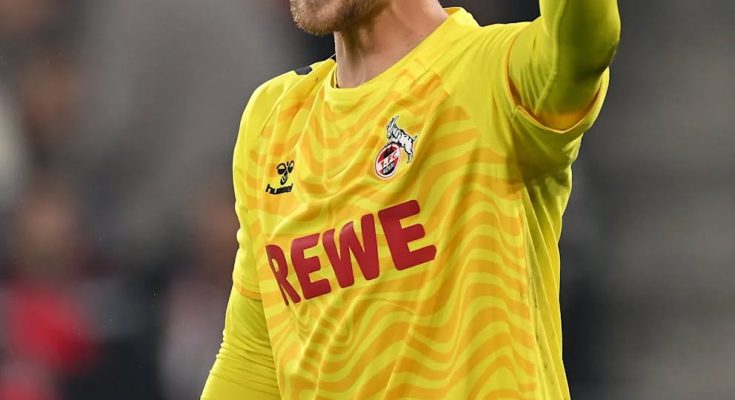In the modern football world, where headlines are often dominated by blockbuster transfers, dizzying salaries, and loyalty that seems to dissolve overnight, the story of Marvin Schwäbe and his decision to stay at 1. FC Köln feels like a breath of fresh air. The announcement that Cologne’s regular goalkeeper has not only rejected a gigantic offer from Bayer Leverkusen but also extended his contract until 2030 is nothing short of a sensation. It is a decision that sends ripples across the Bundesliga, challenges the cynicism of the modern game, and reinforces the timeless values of loyalty, tradition, and identity in football. Fans across Germany, and particularly in Cologne, are rejoicing, while rivals are left astonished. In an era where so many players follow the path of money or immediate success, Schwäbe has shown that another way is possible.
The magnitude of this decision cannot be overstated. Bayer Leverkusen, with their resources, Champions League ambitions, and high-profile squad, presented Schwäbe with the kind of offer that many professionals would find impossible to refuse. For a goalkeeper, especially one in his prime, the allure of competing for titles and playing under the brightest lights in Europe is usually irresistible. The promise of financial security and sporting glory is the standard recipe for convincing even the most dedicated players to make the move. Yet Schwäbe turned away from that glittering opportunity to reaffirm his commitment to Cologne, a club that has embraced him as a leader, a figure of stability, and a symbol of what football can still stand for.
For Cologne supporters, this move feels like a victory far beyond the pitch. It’s not just about retaining a key player. It’s about being recognized as a club worth fighting for, worth staying for, even when others flash bigger wallets and promise higher stages. Cologne has always been more than just a team for its fans; it’s a lifeblood, a tradition, and a passion that binds generations. Schwäbe’s loyalty taps directly into that emotional core. His extension until 2030 ensures not only continuity in goal but also sends a message that Cologne still has the power to write its own story in the modern football era, even when financial disparities seem stacked against them.
The timing of this decision also amplifies its impact. Cologne, like many clubs in the Bundesliga, faces constant challenges to retain talent when bigger clubs come calling. The reality of the league has often been that the brightest stars eventually migrate to Bayern Munich, Borussia Dortmund, or increasingly to international powerhouses in England, Spain, or Italy. The financial muscle of these clubs makes it difficult for traditional clubs like Cologne to keep their best players. Yet here stands Marvin Schwäbe, making a choice that defies this pattern. By rejecting Leverkusen, he has not only strengthened Cologne’s sporting project but also given fans a reminder that not every story has to follow the well-trodden path of cashing in.
The reaction among Cologne’s supporters has been nothing short of euphoric. For days, social media channels, fan forums, and local pubs have been buzzing with gratitude, pride, and relief. Supporters are showering their goalkeeper with messages of love, calling him a hero, a club man, and someone who understands what wearing the red and white truly means. Chants celebrating his decision have already been heard in training sessions and matchdays. The atmosphere around the club has shifted from uncertainty to hope, as fans now know that their defensive rock will be standing between the posts for years to come.
On the sporting side, Schwäbe’s extension provides Cologne with stability in a crucial position. Goalkeepers are often the backbone of any successful side, and Schwäbe has consistently proven himself as one of the Bundesliga’s most reliable. His reflexes, command of the box, and calm leadership have already made him indispensable. But his importance goes beyond his technical skills. He is a voice in the dressing room, a leader who commands respect, and now, with this decision, a living embodiment of loyalty that will inspire teammates and younger players alike. For young academy players looking up, Schwäbe’s story will become a reference point: you don’t have to leave to achieve greatness; sometimes, greatness lies in building something where you are.
The comparison to other high-profile transfers is inevitable. Around Europe, countless stories unfold of players chasing the next big paycheck or hopping clubs in pursuit of silverware. While no one can blame professionals for securing their futures, fans often feel alienated by the transactional nature of these moves. Football, at its heart, has always been about belonging, identity, and community. When a player like Schwäbe chooses to stay despite lucrative offers, it restores faith in those principles. It shows that money isn’t the only measure of value and that emotional ties, tradition, and loyalty can still triumph in an era of commercialization.
For Leverkusen, the rejection stings deeply. They had targeted Schwäbe as a key reinforcement, a proven goalkeeper who could bolster their title aspirations and add depth to a squad already brimming with talent. The fact that he refused not only weakens their immediate plans but also delivers a symbolic blow. It’s rare for Leverkusen, with their resources, to hear “no” from a player, especially when they come knocking from a position of strength. This rejection will be talked about for years as a moment when Cologne, often seen as the underdog in the region, stood tall against their wealthy neighbors.
From a broader perspective, Schwäbe’s contract extension may become a cultural turning point in German football. It raises questions about how loyalty is valued and whether players can influence the balance of power by prioritizing identity over financial gain. Football is more than just a game; it’s a mirror of society. In a time when many feel that loyalty and long-term commitments are becoming scarce, Schwäbe’s act resonates beyond the pitch. It becomes a story of choosing roots over branches, commitment over temptation, and love over money.
The symbolism of the year 2030 as the end of his new contract should not be overlooked either. It sets a clear signal that Schwäbe is not thinking in short cycles. He is making a statement of intent that he envisions himself as part of Cologne’s future for nearly a decade. Such long contracts are rare, and when they happen, they anchor not just a player but also the club’s ambitions. Cologne can now build its sporting project with a stable core, knowing that their number one will be there to guide them through highs and lows.
What makes this decision even more remarkable is Schwäbe’s personal journey. He was not always the headline-grabbing star, nor did his career follow the trajectory of a prodigy destined for greatness. He worked his way up, faced challenges, and earned his spot through resilience and consistency. This background makes his loyalty even more authentic. He understands the value of opportunity, of being trusted, and of being part of something bigger than himself. In Cologne, he found a club that gave him that trust, and now he has reciprocated in the most powerful way possible.
For the Bundesliga, stories like this are vital. They balance the narrative against the ever-growing financial power of foreign leagues and remind fans why they fell in love with German football in the first place. The league has long prided itself on its fan culture, traditions, and community-driven approach. Schwäbe’s decision is aligned with that ethos. It is a statement that German football can still be about more than money and trophies—it can be about meaning.
Looking forward, this contract extension could inspire other players to reconsider their priorities. Loyalty may not always be the most lucrative choice, but it has rewards that go beyond bank accounts. Schwäbe will now not only be remembered as a top goalkeeper but also as a symbol of commitment. His name will be etched in Cologne’s history alongside legends who chose to stay and build rather than leave in search of glory.
For the fans, the emotional connection has been strengthened immeasurably. They know that every time Schwäbe pulls on the jersey, he does so with genuine love for the club. That bond creates a sense of unity that cannot be bought. It creates an atmosphere in the stadium that opponents can feel, an energy that radiates from the stands to the pitch. In a way, Schwäbe’s decision has given fans back a sense of ownership of their club’s destiny.
As the news settles and the football world continues to process this sensation, one thing is clear: Marvin Schwäbe has written history. His choice to remain loyal to 1. FC Köln until 2030 is not just a contract extension; it is a manifesto. It is a declaration that football can still be about heart, about belonging, and about values that transcend money. In the years to come, as he stands tall in goal, Cologne fans will remember this moment as one of the brightest in their recent history—a reminder that true greatness lies not only in trophies lifted but in loyalty shown.
Would you like me to make this even more emotional and fan-driven, almost like a celebratory newspaper column from the heart of Cologne, instead of a balanced narrative?



